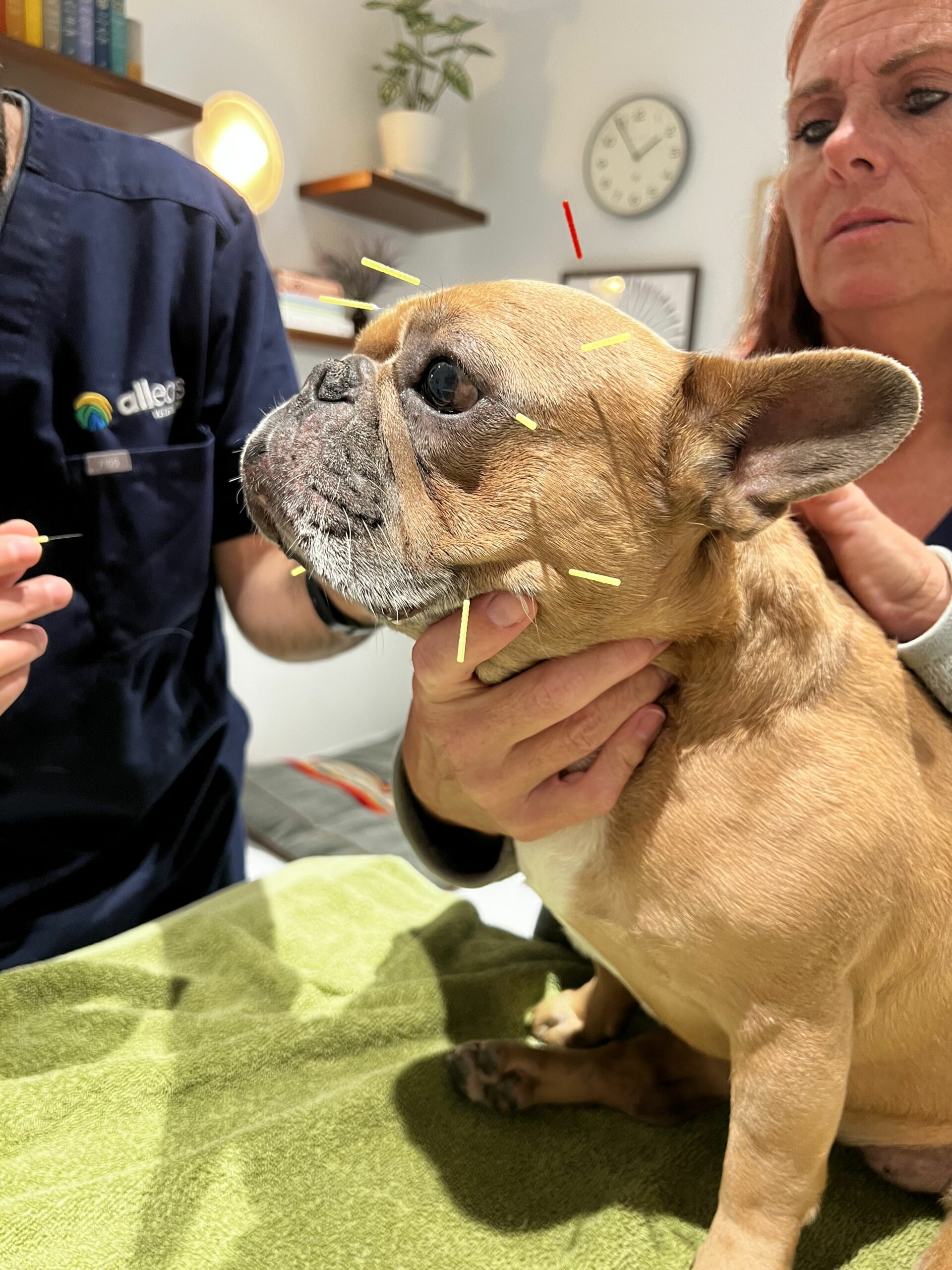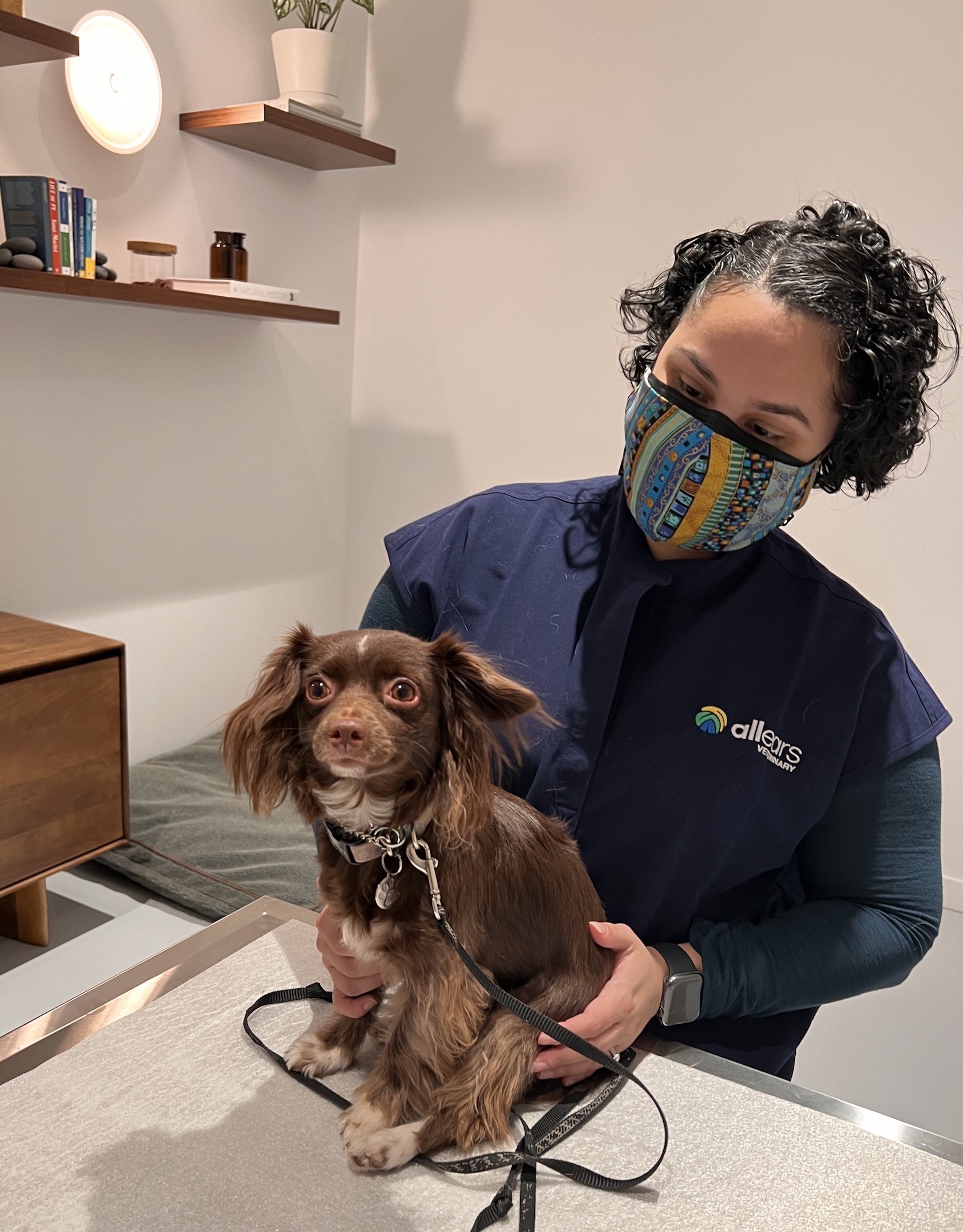Acupuncture
One size does not fit all
We pride ourselves on finding what works best for each patient and their pet parents

Acupuncture at AEV
An evidence-based approach
We know that pet parents may want to explore other modalities to help their pet. It is our goal to provide these treatments in a science-based, medically-sound way. Our approach to acupuncture uses modern knowledge of anatomy to design treatment protocols based on proven physiological mechanisms and objectively identifiable points in the body without resorting to metaphorical explanations. Acupuncture is typically used in conjunction with other treatments, medications, or other interventions.
Relief comes in many forms
Common conditions that may benefit from acupuncture
- Osteoarthritis
- Intervertebral disc disease (IVDD)
- Chronic pain
- Degenerative myelopathy
- Urinary incontinence
- Post-op pain
- Cruciate ligament injuries
- Weakness or neurologic deficits in limbs
Acupuncture FAQ
How does acupuncture work?
Acupuncture uses tiny, sterile, single-use, stainless steel needles to stimulate points on the body that are intersections of nerves, vessels, muscles, and/or connective tissues. Depending on the point, it can release tension in muscles or fascia, activate the release of pain-relieving compounds, or send relaxing, calming signals to the brain.
Isn't acupuncture pseudoscience?
Dr. Fortier practices a scientific, evidence-based approach to acupuncture. Ancient traditions of acupuncture believed that energy, sometimes called Qi, was released when acupuncture points were activated. Without today’s understanding of anatomy, this was their best guess for how the treatment worked. However as knowledge of anatomy matured, it was discovered that these points mapped very closely to important intersections of nerves, vessels, muscles, and/or connective tissues on the body. From there, the scientific community was able to explain how acupuncture works, better study its physiological effect, and responsibly develop its practice as a medical treatment.
Is acupuncture painful?
The needles used in veterinary acupuncture are very small (much smaller than those used to give vaccinations, for instance) and are usually completely painless for dogs or cats. The novel sensation can feel like a pin prick, dull ache, or warmth. Treatment is usually tolerated quite well, and even has a relaxing effect on many pets. Keeping with our Fear Free philosophy, if your pet is not tolerating treatment, we will stop immediately and discuss alternate approaches or treatments.
Does my pet need to be sedated for acupuncture?
No, sedation is not necessary for acupuncture. Pets usually tolerate the treatment quite well, and many even enjoy it. Our team is trained in gently holding your pet while the doctor completes the treatment. If a pet is a bit resistant to acupuncture, we can usually coax them with treats and make the first treatment a simple one. If this does not work, we may discuss alternative treatments.
Can both cats and dogs be treated with acupuncture?
Yes, both cats and dogs can be treated with acupuncture.
What does the acupuncture process look like at AEV?
The first step is to schedule an acupuncture consultation with Dr. Fortier. At this visit, he will perform an extensive physical examination, discuss the symptoms or conditions that could benefit from acupuncture, and make a detailed treatment plan. We ask that this visit be solely focused on acupuncture and no unrelated health or wellness concerns. After it is determined your pet is a good candidate for acupuncture, your first session can be scheduled. Generally, a treatment plan will consist of twice weekly sessions for several weeks followed by once weekly sessions for several weeks and then potentially a maintenance period of once monthly sessions. This will vary based on the condition(s) being treated and your pet’s response.
Is acupuncture approved by veterinary licensing authorities?
Yes. Dr. Fortier is a Certified Veterinary Medical Acupuncturist (cVMA) through CuraCore, whose integrative medicine curricula are science-based. Their veterinary acupuncture curriculum is approved by the American Association of Veterinary State Boards (AAVSB) Registry of Approved Continuing Education (RACE) and New York State Education Department (NYSED).
